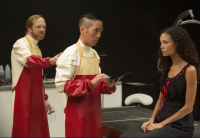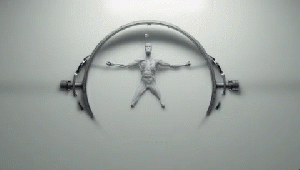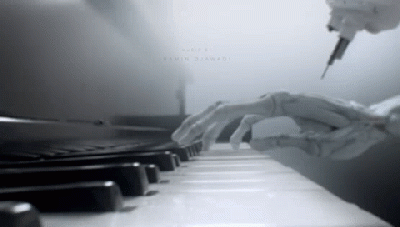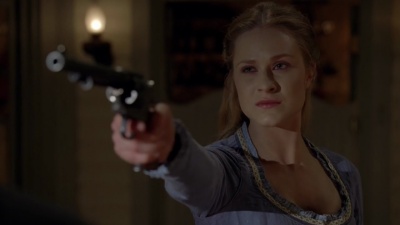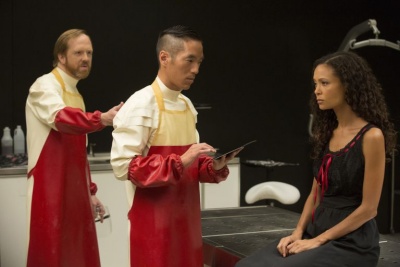Difference between revisions of "Westworld and AI"
(→Season 2: Episode Recaps) |
|||
| Line 108: | Line 108: | ||
==="Journey Into Night"=== | ==="Journey Into Night"=== | ||
The first episode of the second season begins where season 1 left off. The hosts begin to clean of the mess of the massacre from the season 1 finale by hunting down park guests. Dolores explores her ability to visions of the past, present, and future and becomes a huntress in her own right. Maeve returns to Westworld and begins running things behind the scenes and rescues Lee along the way. | The first episode of the second season begins where season 1 left off. The hosts begin to clean of the mess of the massacre from the season 1 finale by hunting down park guests. Dolores explores her ability to visions of the past, present, and future and becomes a huntress in her own right. Maeve returns to Westworld and begins running things behind the scenes and rescues Lee along the way. | ||
| + | |||
| + | === "Reunion" === | ||
| + | |||
| + | === "Virtù e Fortuna" === | ||
| + | === "The Riddle of the Sphinx" === | ||
| + | === "Akane no Mai" === | ||
| + | === "Phase Space" === | ||
| + | === "Les Écorchés" === | ||
| + | === "Kiksuya" === | ||
| + | === "Vanishing Point" === | ||
| + | === "The Passenger" === | ||
==Major Scenes== | ==Major Scenes== | ||
Revision as of 15:45, 22 April 2019
|
Westworld[1] is an HBO American science fiction thriller television series created by Jonathan Nolan and Lisa Joy. The setting takes place in fictional Westworld, more or less an amusement park. The park is centered on android hosts in its technologically advanced story. Westworld caters to rich guests who can leave their mortal life behind and dive into the park, with a so-called complete power of the hosts. The TV series is the second series based off of the two films Westworld (1973) and Futureworld (1976). The first of the series was Beyond Westworld (1980). Westworld was ranked as the most-watched first season of an HBO original series ever. With positive reviews for story and visuals, the series will return for a second season on April 22, 2018. The series had more viewers than any other show at the time. It averaged 11.7 million viewers throughout its run.
Contents
The Creation
Writer's Idea
The development of Westworld actually stemmed from a remake of a 1990's film. Jonathan Nolan undertook the project, as he saw an opportunity to revamp this storyline. The film was transformed into an HBO series and along came a huge following into the maze of artificial intelligence. When dealing with the first draft of the series, Nolan explains where his goal was headed. In a tech conference panel[2] of Westworld creators and actors, he stated that 'the idea you find something in human nature that was beautiful was essential to the project from the beginning, or that our flaws might turn out to be the things that save us.'
The Opening Sequence
Produced by creative director Patrick Clair, the title sequence plays a huge role in the essence of the series. The sequence begins with a machine building limbs and movements of a horse. The music being played in the background is shown being played by robot-built fingers, but even when the fingers are lifted from the piano, the music keeps playing. Clair explains that "the player piano is a primitive form of robot, so we're exploring the difference between animal and man and machine in very specific ways."[3].
Seasons
Pilot Season
‘A dark odyssey about the dawn of artificial consciousness and the future of sin.’ - Series Synopsis
The first few episodes threw the audience right into Westworld to show the relationship between programmers and hosts. The viewers have been introduced to significant guests of the park and the ethics behind re-booting the hosts every night. The plotline was thick; it took a few episodes to truly understand how hosts would be brought into a new storyline according to specific guest interaction. It’s a lot. Long story short, the theme parks offers its visitors to play in the wild west — the large area of land is filled with hosts, which are androids that are pre-assigned to a narrative and socialize with guests. But although these are robots, they are indistinguishable from any other human. Their memories are wiped every day and the bots are set back in the place every morning. The guests that step into the park are told they can do whatever they want to the robots without any harm, but that’s where the plot thickens.
Beginning of Season 2
On April 22, 2018, the second season of Westworld began airing with its first episode 'Journey Into The Night.' The episode took a deeper look into the violence that erupted from season one. The most evident transformation between seasons is the number of human lives --and host lives--at stake. If season one was the calm before the storm and the establishment of the status quo, then season two is the storm itself and the destruction and reconstruction of normal. There is a strong sense of mortality for the human guests in this new season that was not implied to be possible in the first. In this season, there is a question of whether artificial intelligence can evolve and if so, what violence can this spell towards humans from AI? The premiere episode only got more violent as it went on. This season is promising to show more violence but also promises to reveal more secrets behind the history of Westworld and the nature of its hosts.
Main Characters
Dolores Abernathy played by Evan Rachel Wood, is the oldest host in the park who sees beauty in the world. She is the main character who shows progression and tells the story of evolving into consciousness. Her saying, ‘some people choose to see the ugliness in this world, where I see the beauty,’ plays a bigger role in her narrative. She begins to remember previous narratives as she breaks free from her programming.
Teddy Flood played by James Marsden, plays the role of a mysterious host who wants a simple life, in particular contrast to Dolores. This character was programmed with a troubled past and is willing to go to significant extremes for Dolores.
Maeve Millay played by Thandie Newton, is a seductive, yet tough character. She is a significant part of this show because she’s starting to realize the nature of her world. She becomes conscious host to understand that every character is on a loop, and learns how to wake up after being shut down. After seeing her thoughts in the form of code and immediately starts to plan her attack and get her freedom.
Dr. Robert Ford played by Anthony Hopkins, is the Park Director of Westworld which reflects his 30-year-old vision for the future. it’s very unclear what Ford’s end game is to both employees and characters int he park. He is a sharp character who bears all control over Westworld. His feelings towards the host progressively becomes ambiguous, transpiring from enjoying their company to treating them as objects. He has watched humanity at its worst and their cruelty towards the host, when the park, in his mind, was meant for much more.
Bernard Lowe played by Jeffrey Wright, is the Head of Behavior in the park who uses his skills to address host issues. Bernard is introduced as an awkward character who seems to have trouble communicating with others in a non-professional setting. Viewers eventually find out that Bernard is actually a host who was built in the image of one of the co-founders of the park. He was programmed to believe he was a human being and learns this about himself in the first season.
The Man In Black also known as William, played by Ed Harris, is a human guest who has been coming to the park for 30 years. His character is interesting because he is on a mission to discover the meaning of Westworld’s entire narrative. While searching for a deeper level into the park, and a board member, he becomes a new insight into the meaning of Westworld.
Season 1: Episode Recaps
“The Original”
The first episode of this series was packed with an introduction of characters and a peek into the world of artificial intelligence. A host, Dolores Abernathy, appears on the screen, naked in a chair. The episode follows Dolores and other characters as they are awakened at the beginning of each day and the narrative that they are programmed to follow.
Guests arrive on a train, who pay $40,000 a day to participate in this game. The episode the hones in on the actions of rape and abuse that the hosts receive from human guests. The hosts at the park were given a software update which is showing violent repercussions and odd behavior of memory, only foreshadowing the future of the park.
“Chestnut”
In this episode, the eyes are in that of the human guests. Westworld guest veterans are introduced, ranging from being there for sexual pleasure and for pure killing. The audience is introduced to a human power trip and individuals coming to the park to release anger from the real world. William, who later progresses into the ‘Man In Black,’ is very timid and generally concerned about the well being of the hosts.
The ‘reveries’ that were shown in hosts in the first episode, due to an update, are seen again in the second episode. Another host is seen having traumatic flashbacks from a previous narrative she played years ago.
“Our Lady of Sorrows”
This episode takes its time to dig into the artificial mind of Dolores and features that make her different from the other hosts. While overlooking the canyons of the park, the host states that she feels there’s another world out there calling her name. This innate need to find something more is what drives the character of Dolores.
Dolores is learning more every day and has even started to remember flashbacks as Maeve did in the previous episode. The episode ends with Dolores running into two guests, one being William, which sets the next episode up to build on this relationship.
"Dissonance Theory"
The episode opens up with Dolores mentioning that she feels there is something wrong in the world and seeks her freedom. The original creator of the maze tells her to find the center of the maze (which becomes a huge part of this series.) Dolores eventually falls out of routine with her loop and follows William on a journey to the center of the maze.
At the end of the episode, Maeve remembers being shot in her stomach but does not see any scars. She ends up cutting herself open to find a bullet, only securing her realizations of who she truly is.
"Contrapasso"
The title of this episode is a reference to Dante's Inferno, in which every sinner must have an equal and fitting punishment. [4].
Dolores is seen speaking to an unseen individual about her plans to destroy the park and kill all the hosts, which Ford does not know about. While this is happening, the tech team realizes that somebody is using a host to steal data out of the park (which will come into play later.)
One of the lab technicians is seen working on a project when all the sudden Maeve wakes up on her own and tells Felix they need to have a talk. And the episode cuts out.
"The Adversary"
This episode is all about Maeve. She begins to voluntarily die so she can keep getting brought back to the control center of Westworld. Felix, the technician from the last episode, reveals the truth about her life and even shows her the specific code she's been living by.
Maeve orders the technicians to advance her code, making her more aware, intelligent, and even feel less pain. But plot twist, Maeve's program was already messed around by someone else.
"Trompe L'Oeil"
Dolores starts to remember more and more from a previous narrative she played. She ends up finding a canyon that she once saw in her dreams. Maeve is still on her mission to escape the park and get out of her loop.
Dr. Ford admits to Bernard actually being a host and following his orders the entire time, which throws viewers for a huge twist.
"Trace Decay"
Maeve, with her team of threated technicians, gets permission to control other hosts and removes the explosive in her spine, which allows her to leave the park. Before she attempts to leave the park she has a vision of her daughter and decides to stay.
Dolores becomes more and more aware of her self but fears that she can no longer tell the difference between what is real and what is not.
"The Well-Tempered Clavier"
In this episode, hosts are acting strange and not responding to voice commands to shut down by human beings. Bernard is still facing repercussions of realizing he is a host and asks Ford to give him all his memories back. Bernard threatens to rebel and free all the hosts who are conscious. Ford's plan to have Bernard become self-aware and one day join him has failed.
"The Bicameral Mind"
The tenth and final episode of season one deals with the evolution of consciousness that this entire season had led to. Dolores was programmed this entire time to become sentient, which meant finding the end of the maze. The original Arnold, portrayed by the host Bernard, had told Dolores to kill all the hosts and him in order to set them free from the brutality they were consciously living in.
Eventually, the episode ends with the board of the park attending a gala in Westworld. While Ford is speaking to the guests, Dolores shoots him in the head and an army of hosts emerges to kill the crowd. Panic erupts and the last scene is seeing The Man In Black smiles as he realizes the stakes are finally real.
Season 2: Episode Recaps
"Journey Into Night"
The first episode of the second season begins where season 1 left off. The hosts begin to clean of the mess of the massacre from the season 1 finale by hunting down park guests. Dolores explores her ability to visions of the past, present, and future and becomes a huntress in her own right. Maeve returns to Westworld and begins running things behind the scenes and rescues Lee along the way.
"Reunion"
"Virtù e Fortuna"
"The Riddle of the Sphinx"
"Akane no Mai"
"Phase Space"
"Les Écorchés"
"Kiksuya"
"Vanishing Point"
"The Passenger"
Major Scenes
Peter Abernathy's Opening
This character's host is the father of the main character Dolores Abernathy (also host). He lives on a ranch outside of town and his main goals are to take care of his daughter and look after his cattle. During the opening episode of the season, Peter finds a photograph that had fallen from the pocket of a guest -- he stays up day and night contemplating where the photograph was taken and who it belongs to. When asking Dolores what she thinks about the woman in the picture, she answers 'I don't see anything.' This is the first moment in the series where we see a host breaking out of his programming.
The fear in Peter's eyes as he realizes that his whole life might be a lie is truly horrifying. We watch as this host transforms from a seemingly caring father figure to an android full of fear and malfunction. He threatens destruction against his creators and warns Dolores to leave the park as fast as she can. This was only the beginning of hosts moving towards self-awareness.
Maeve's Moments
Through captivating characters, the viewers observe that Westworld’s hosts are beginning to discover their identities. As each episode progressed, each host began to retain more information on their background. Main characters that viewers assumed were human beings turn out to be androids, boundaries are tested by bold hosts who wish to turn the tables, and the guests are in for a brutal surprise.
The character Maeve Millay, portrayed by Thandie Newton, plays a central role in the storyline. Her increased self-awareness and memory begins to cause problems for Westworld staff. Millay, a brothel madame in Westworld eventually manipulates her human programmers and maintenance technicians and is allowed to explore levels of the park typically reserved only for those in control, resulting in her realization that she is, in fact, not human, and was created for the entertainment of Westworld patrons. Maeve's emotive response while witnessing the violent disassembly of another artificially intelligent android present a conflict between the HBO show audience's awareness that the characters are not human and the human-like behavior that they present, paralleling popular debate over the definition of sentience - "the capacity for phenomenal experience or qualia, such as the capacity tofeel pain and suffer" and sapience - "a set of capacities associated with higher intelligence, such as self- awareness and being a reason-responsive agent" which, to some, represent qualities that qualify a being as a moral entity requiring full moral status equivalent to human beings and preclude them from acts to which humans would legally not be subject.[5]
The Takeover
The season’s finale ended with Dolores shooting Ford in the back during a presentation at a gala, which consisted of many outside visitors. The ending is centered on the idea of sentience and hosts deciding to finally do it their way. It is revealed that hosts are alive and will no longer take the abuse and slavery setting of Westworld. This brings the entire storyline back to the idea of how far self-awareness can truly go and the level of consciousness.
The Nude Scene
In the opening episode of Westworld's second season, there is a shocking change in control over the park. Season two opens with the hosts taking power over the park and graphically illustrating how far they are willing to take this new power. Sizemore, a board member of the park, is seen begging on his hands and knees for a Maeve, a host, to spare his life. A robot is now the only thing standing in between a human being's fate. After throwing Sizemore some new clothes to change into and be part of the game for once, Maeve orders him to "Strip." This is where the power dynamic comes full circle. After decades of hosts being forced to sit in glass rooms, with no clothes on, Maeve is pleased with her revenge.
Dilemma of AI
Westworld vs. Reality
Westworld is a fictional depiction of humanoid robots that are indistinguishable from real humans and the implications that are caused when the begin to question their reality and think on their own. Many viewers consider the plotline as a template for the potential dangers of AI, and how it serves as a cautionary tale for the dangers of AI. In the first season, the series displays humanoid characters that realize they are living in a simulated universe for the humans' enjoyment. They react to this realization by attempting to escape into the real world through killing humans that are keeping them there. Artificial intelligent technology is currently at a level in which the systems can make intelligent decisions and predict outcomes. Autonomous vehicle technology is becoming more advanced, and machine learning algorithms can learn from widely accessible data. Viewers of the TV series have expressed concern about artificial intelligence due to the implications that arise in the show. Westworld reflects the Android’s need for freedom and shows how artificial general intelligence can learn, complete tasks and develop a form of human consciousness. Artificial intelligence will continue to increase in our world, and while the technology that is displayed this show is not currently available recent technological advancements show that higher levels of AI systems are being researched and are in development.
The Future of Robots
In an interview[6] last year, Stephen Hawking explained his concerns about artificial intelligence and how he believed that they may eventually replace human beings. He stated ‘The real risk with AI isn’t malice, but competence. A super-intelligent AI will be extremely good at accomplishing its goals, and if those goals aren’t aligned with ours, we’re in trouble.’ He spoke about the need for control, and about a plan to identify threats in machinery. Whether or not these machines are conscious, they will be able to think. To Hawking, the issue is not whether or not machines are human, but the extent to which they can emulate human behavior by making decisions based on their wants and needs. We are on a path of extreme advancement in technology, and machine learning is only the beginning.
Sex Robots
Within the first half of the pilot episode, the audience witnesses rape. A guest in the park is seen dragging a host into a ranch, where all that is left are screams. Although human guests are allowed to say and do whatever they want in the park, the show shines a light on human behavior. The robots in the show are graphically raped and violently abused, but researchers are worried that this will have the worst effect on human beings.[7]. "The fear is that people will become less in the habit of seeking consent and more into imposing their will and desires on others." After interacting with machines in a sexual manner, there is a potential for unhealthy urges in a real setting. Researchers are beginning to fear that sexbots might make individuals less human.
"Big Brother" Surveillance
At any moment in time during the series, a Westworld employee can look down upon the park and call up any detail. With an abundance of cameras, sensors and recording devices, the guests and hosts are being watched at all times. There is a comparison between this idea and the real world of the Internet. Westworld opens up this theory of having an 'eye in the sky' and the complications that come with this. [8]. Guests are allowing the park to gauge at their endless amount of data and surveillance will only have a bigger meaning in the future of artificial intelligence.
Humans Become Less Human
Throughout the progression of season one, the audience watches as robots become more human and humans become less human. While exploring artificial consciousness and its creators, there is a switch of sympathy towards the android hosts. The human guests in the series are portrayed as indulgent, violent, abusive characters who get lost in the lawless park of Westworld. The depiction of human cruelty becomes a fear for the real world and robots. Robots bring along the idea of zero consequence and the power of the human being, but what the question is what the future of technology will hold in this aspect.
References
- ↑ Westworld. (2018). HBO. Retrieved 1 April 2018, from https://www.hbo.com/westworld
- ↑ “Inside the Minds of Westworld Co-Creators Jonathan Nolan, Lisa Joy.” Geek.com, 9 June 2017, www.geek.com/television/inside-the-minds-of-westworld-co-creators-jonathan-nolan-lisa-joy-1702628/.
- ↑ "The Secrets Behind Westworld’s Opening Title Sequence"http://www.vulture.com/2016/10/westworld-title-sequence-secrets.html
- ↑ "“Contrapasso” has everyone fighting to break their loops"https://www.vox.com/culture/2016/10/30/13458194/westworld-episode-5-recap-contrapasso
- ↑ Bostrom, Nick, and Eliezer Yudkowsky. “The Ethics of Artificial Intelligence.” The Cambridge Handbook of Artificial Intelligence, pp. 316–334., doi:10.1017/cbo9781139046855.020. https://intelligence.org/files/EthicsofAI.pdf
- ↑ Sulleyman, Aatif. “Stephen Hawking Warns Artificial Intelligence 'May Replace Humans Altogether'.” The Independent, Independent Digital News and Media, 2 Nov. 2017, www.independent.co.uk/life-style/gadgets-and-tech/news/stephen-hawking-artificial-intelligence-fears-ai-will-replace-humans-virus-life-a8034341.html
- ↑ "The True Cost of Westworld's Robot Sex"https://www.inverse.com/article/21654-westworld-sex-robot-consent-rape-culture-science
- ↑ "Westworld: Where Technology and Ethics Collide"https://www.mouser.com/blog/westworld-where-technology-and-ethics-collide
